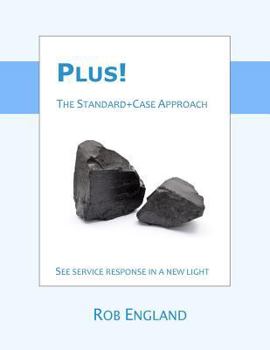Plus! The Standard+Case Approach: See service response in a new light
If your customers see your group as bureaucratic and inflexible... If your staff feel process bound... If your process doesn't adapt to a changing world... See service response in a new light. Standard+Case is an exciting new approach to categorising and resolving any sort of response activity, such as service desk, tech support, public safety, social welfare, or health. If you have anything to do with responding to situations when providing a service, read this. It will change your view of how responses are handled. Standard+Case applies to anything that requires a human response: there's either a standard response or there isn't. Standard+Case is a new paradigm for categorising and resolving any sort of response "tickets", such as service desk requests (including incidents), problems, or operational changes. The phrase "a new paradigm" gets much over-used but this time it applies. This approach changes the way we think about everything to do with response. Standard+Case is a universal approach to responding to situations. It offers the following tangible benefits: - better utilisation of staff resources through greater throughput of responses because of more effective and efficient resolution of unknown and unfamiliar situations - reduced user down-time and time spent waiting on responses - fewer errors in complex and complicated situations. Standard+Case offers the following intangible benefits: - greater flexibility in responding to user needs - higher customer and user satisfaction - improved staff morale - better metrics: greater predictability of Standard responses and more meaningful monitoring of Case responses Much of our thinking in providing service is drawn from manufacturing, and focuses on standardisation (definition, repeatability) and statistical improvement of repeated tasks. But we no longer live in an industrial economy; we live in a service economy. We no longer manage industrial production lines; we manage the delivery of services to people. People cannot to be standardised. Much of our traditional approach tries to make them be standardised: to engage users in a standard manner, to respond back to them in equally standard ways. We pretend the world is standardised. When it is not - when non-standard things happen - we treat them as exceptions, and as failures of the system. Think of long-running incidents, or requests that do not fall into any defined category. As a consequence, non-standard responses are poorly controlled, misleadingly reported, and no formal practices exist; so there is minimal structured improvement of how we deal with them. Standard+Case acknowledges reality: much of our service activity will always be non-standard and has to be dealt with in a formalised way in order to manage, report and improve it as we do for the standardised part. We do that by treating non-standard responses as cases. Standard+Case accepts that much of the service world is non-standard. It is not a new way of responding to situations; it is simply a new way of looking at what we do now. We do respond to non-standard situations now, but we have little rigour around who and how. Standard+Case formalises and brings rigour to our ad-hoc response, so that all instances of service response are managed, reported and improved, not just the standard ones.
Format:Paperback
Language:English
ISBN:1482061740
ISBN13:9781482061741
Release Date:May 2013
Publisher:Createspace Independent Publishing Platform
Length:122 Pages
Weight:0.85 lbs.
Dimensions:0.3" x 8.5" x 11.0"
Customer Reviews
0 rating





